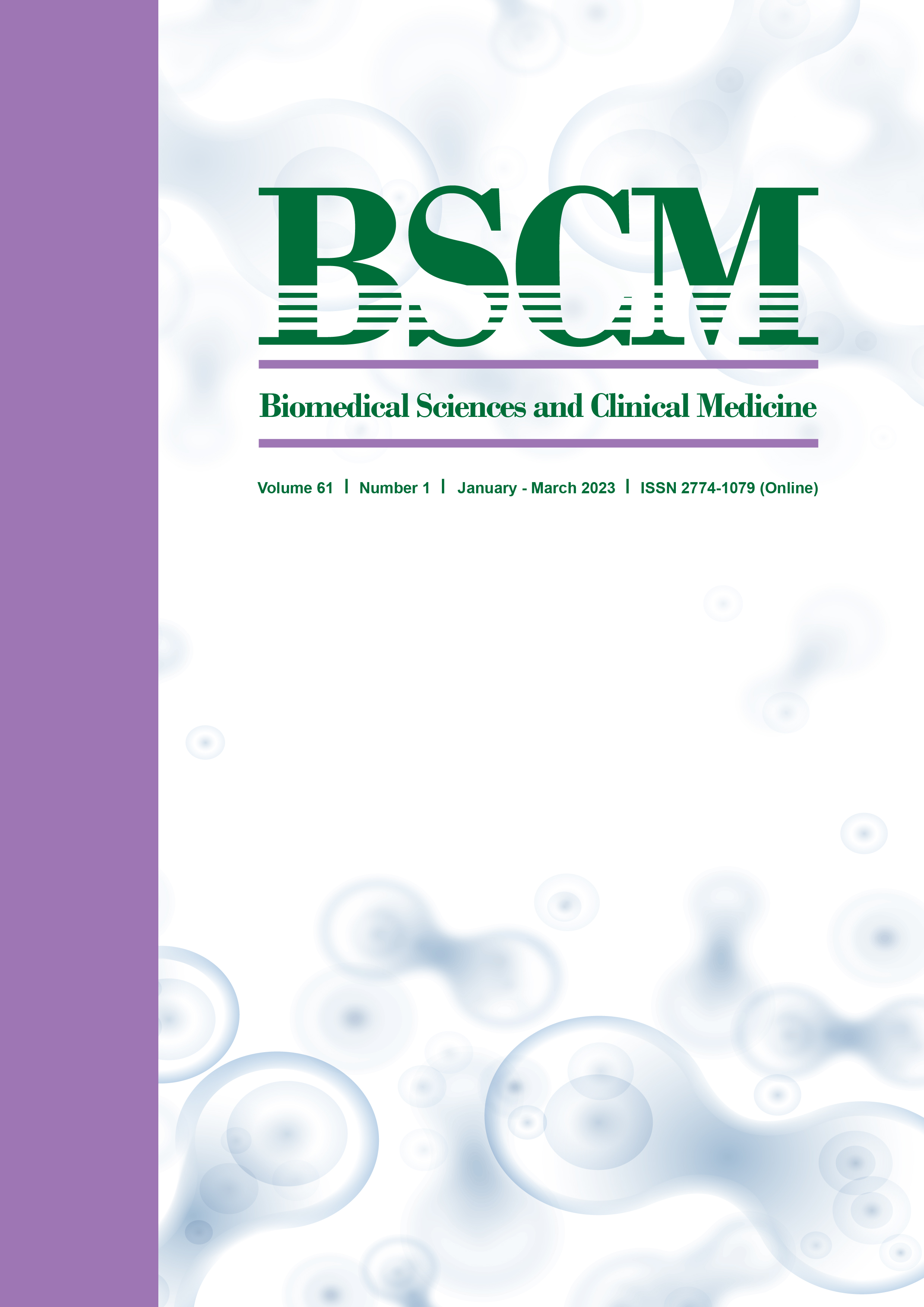The Effect of Listening to Music on Stress Reduction among Twelfth-Grade Students
Keywords:
stress, music listening, students, adolescents, relaxAbstract
Objective: To examine the effects of listening to music on stress reduction among twelfth-grade students.
Methods: A quasi-experimental study was conducted. Of 116 twelfth-grade students recruited from a public school in Bangkok, Thailand, 82 completed the study. During a 20-minute period, an intervention group (47 students) listened to music drawing upon nature sounds, whereas a control group (35 students) read about stress reduction techniques. Measurements were made of heart rates and stress levels (using the Thai Stress Test [TST] and a 5-point Likert scale [stress 5-PL]) at baseline and immediately after the activities. A t-test and Chi-squared test for linear-by-linear association were used to compare changes in the stress parameters.
Results: Analysis of the baseline and post-intervention data revealed that music listening significantly reduced heart rates and scores for TST and stress 5-PL (p = < 0.001, 0.016, and < 0.001, respectively). However, reading about stress reduction produced no significant lowering of heart rates or scores for TST and stress 5-PL (p = 0.057, 1.000, and 0.070, respectively). In a comparison between the groups, there were no significant differences in the reductions in heart rates or scores for TST and stress 5-PL (p = 0.490, 0.182, and 0.199, respectively).
Conclusions: Listening to music for 20 minutes significantly decreased both physical and psychological stress. Nevertheless, the reduction did not differ from that achieved by reading about stress reduction.
References
Miryala RK. Trends, challenges & innovations in management – volume III. Telangana: Zenon Aca-demic Publishing; 2015.
Ojha U. managing teen stress. Psychosocial aspect of health and illness. Delhi: Global Vision Publish-ing House; 2015.
Chandra A, Batada A. Exploring stress and coping among urban African American adolescents: the shifting the lens study. Prev Chronic Dis. 2006;3: A40.
Jayanthi P, Thirunavukarasu M, Rajkumar R. Ac-ademic stress and depression among adolescents: a cross-sectional study. Indian Pediatr. 2015;52: 217-9.
Maritta V, Ruthaychonnee S, Minna A. Survey of adolescents’ stress in school life in Thailand: im-plications for school health. J Child Health Care. 2017;21:222-30.
Spear LP. The adolescent brain and age-related behavioral manifestations. Neurosci Biobehav Rev. 2000;24:417-63.
Dechkum K. A study of stress of Mathayom Suksa six students during the economic crisis. Bangkok: Chulalongkorn University; 1998.
Vo D, Park MJ. Stress and Stress Management Among Youth and Young Men. Am J Mens Health. 2009;2:353-66.
Khalfa S, Bella SD, Roy M, Peretz I, Lupien SJ. Ef-fects of relaxing music on salivary cortisol level after psychological stress. Ann N Y Acad Sci. 2003; 999:374-6.
Nater UM, Abbruzzese E, Krebs M, Ehlert U. Sex differences in emotional and psychophysiological responses to musical stimuli. Int J Psychophysiol. 2006;62:300-8.
Burns J, Labbé E, Williams K, McCall J. Perceived and physiological indicators of relaxation: as dif-ferent as Mozart and Alice in chains. Appl Psycho-physiol Biofeedback. 1999;24:197-202.
Juslin P, Sloboda J. Handbook of music and emo-tion: theory, research, applications. Oxford: Ox-ford University Press; 2010.
Jacobsen SL, Pedersen IN, Bonde LO, Odell-Mill-er H. A comprehensive guide to music therapy, 2nd Edition: theory, clinical practice, research and training. London: Jessica Kingsley Publishers; 2019.
Bonde LO, Wigram T. A comprehensive guide to music therapy: theory, clinical practice, research and training. London: Jessica Kingsley Publishers; 2002.
Chlan L. Music therapy as a nursing intervention for patients supported by mechanical ventilation. AACN Clinical Issues. 2000;11:128-38.
Solanki MS, Zafar M, Rastogi R. Music as a therapy: role in psychiatry. Asian J Psychiatr. 2013;6:193-9.
Watkins G. Music therapy: proposed physiological mechanisms and clinical implications. Clin Nurse Spec. 1997;11:43-50.
Lee O, Chung Y, Chan M, Chan W. Music and its effect on the physiological responses and anxiety levels of patients receiving mechanical ventila-tion: a pilot study. J Clin Nurs. 2005;14:609-20.
de Witte M, Spruit A, van Hooren S, Moonen X, Stams G-J. Effects of music interventions on stress-related outcomes: a systematic review and two meta-analyses. Health Psychol Rev. 2020;14: 294-324.
Linnemann A, Wenzel M, Grammes J, Kubiak T, Nater U. Music listening and stress in daily life-a matter of timing. Int J Behav Med. 2017;25: 223-30.
Phattharayuttawat S, Ngamthipwathana T, Sukhatungkha K. The development of the Thai Stress Test. 2000;45:237-50.
Elo A-L, Leppänen A, Jahkola A. Validity of a sin-gle-item measure of stress symptoms. Scand J Work Environ Health. 2004;29:444-51.
Linnemann A, Ditzen B, Strahler J, Doerr J, Nater U. Music listening as a means of stress reduction in daily life. Psychoneuroendocrinology. 2015;60: 82-90.
Allen K, Golden LH, Izzo JL, Jr., Ching MI, For-rest A, Niles CR, et al. Normalization of hyper-tensive responses during ambulatory surgical stress by perioperative music. Psychosom Med. 2001;63:487-92.
Thoma M, Marca R, Brönnimann R, Finkel L, Ehlert U, Nater U. The effect of music on the hu-man stress response. Plos One. 2013;8:e70156.
Han L, Li JP, Sit JW, Chung L, Jiao ZY, Ma WG. Ef-fects of music intervention on physiological stress response and anxiety level of mechanically venti-lated patients in China: a randomised controlled trial. J Clin Nurs. 2010;19:978-87.
Van Daele T, Hermans D, Audenhove C, Van den Bergh O. Stress reduction through psychoeduca-tion a meta-analytic review. Health Educ Behav. 2012;39:474-85.











